Personal Professional Development Report - Hilton Hotels & Resorts
VerifiedAdded on 2020/06/05
|17
|4010
|40
Report
AI Summary
This report analyzes personal and professional development (PPD), focusing on the context of Hilton Hotels & Resorts. The introduction defines PPD as a process of self-managed career progression, emphasizing its importance in bridging the gap between an individual's current position and their desired standard. The report delves into Task 1, exploring approaches to self-managed learning, including internet resources, social networks, and seminars, alongside the encouragement and benefits of lifelong learning for individuals and organizations. Task 2 assesses the alignment of personal skills with professional standards and organizational objectives, identifying development needs and opportunities. It also includes the creation of a personal professional development plan. Task 3 outlines the processes and activities required for implementing the development plan, including scope, implementation, and impact. Finally, Task 4 addresses solutions for work-based problems, communication styles, and effective time management. The report underscores the significance of continuous learning and skill enhancement for both individual growth and organizational success.
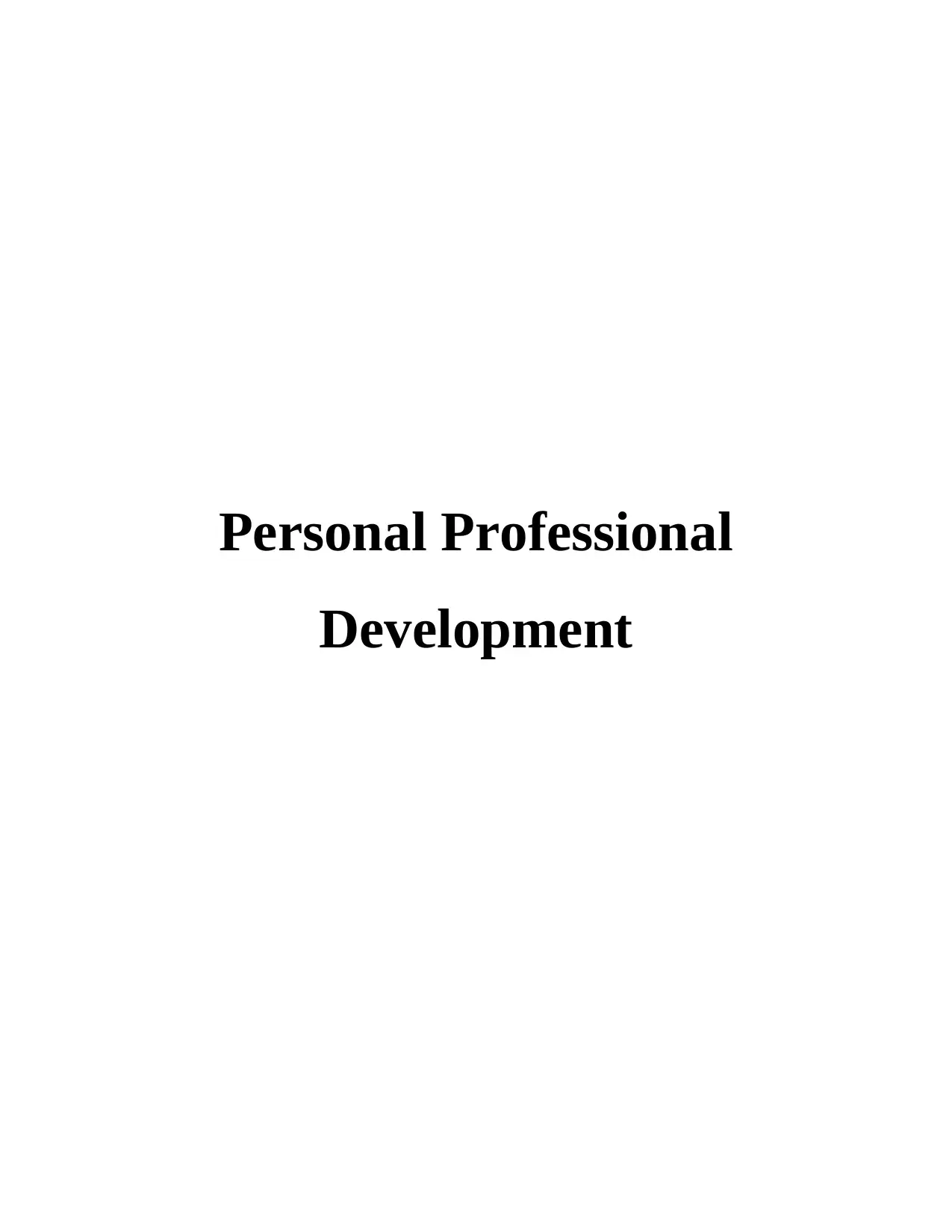
Personal Professional
Development
Development
Paraphrase This Document
Need a fresh take? Get an instant paraphrase of this document with our AI Paraphraser
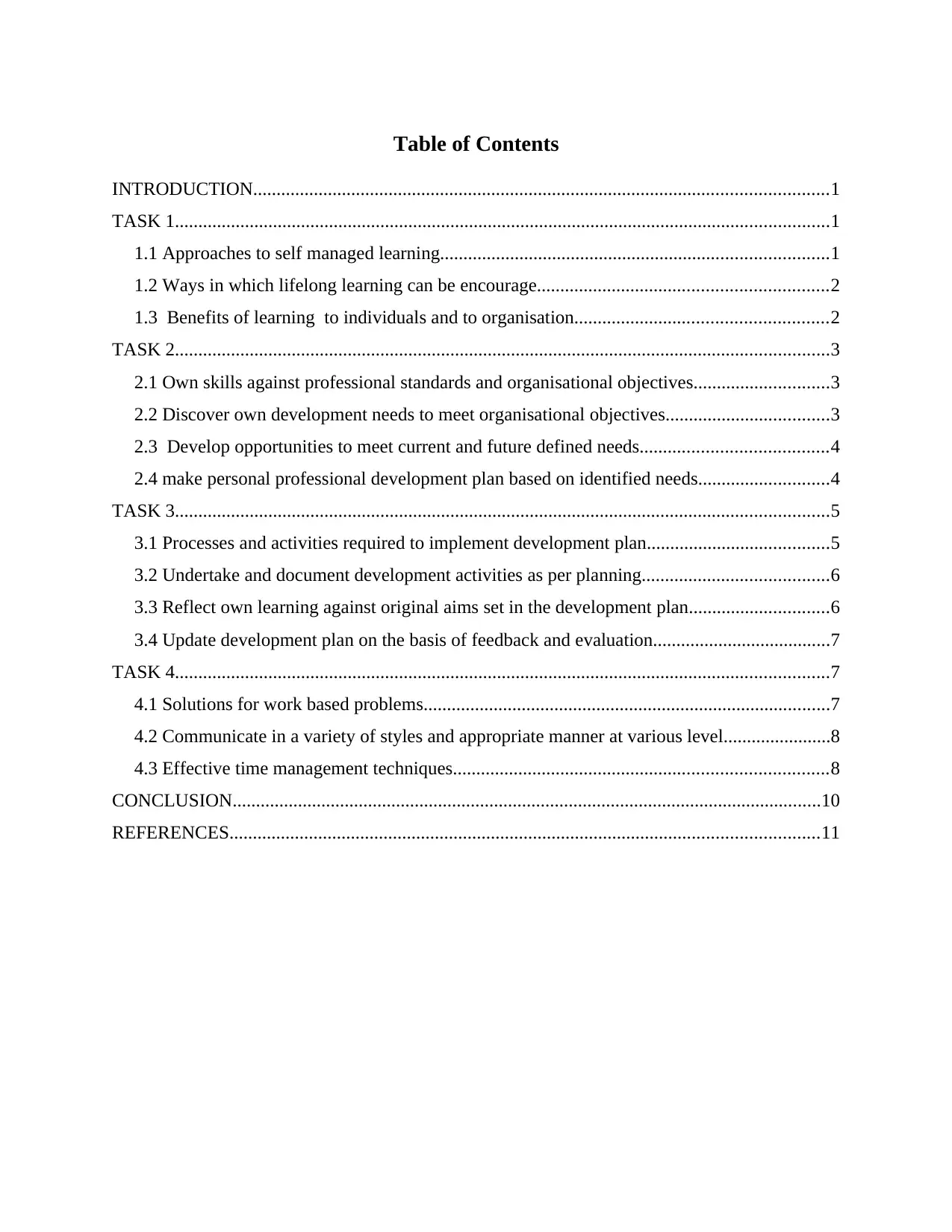
Table of Contents
INTRODUCTION...........................................................................................................................1
TASK 1............................................................................................................................................1
1.1 Approaches to self managed learning...................................................................................1
1.2 Ways in which lifelong learning can be encourage..............................................................2
1.3 Benefits of learning to individuals and to organisation......................................................2
TASK 2............................................................................................................................................3
2.1 Own skills against professional standards and organisational objectives.............................3
2.2 Discover own development needs to meet organisational objectives...................................3
2.3 Develop opportunities to meet current and future defined needs........................................4
2.4 make personal professional development plan based on identified needs............................4
TASK 3............................................................................................................................................5
3.1 Processes and activities required to implement development plan.......................................5
3.2 Undertake and document development activities as per planning........................................6
3.3 Reflect own learning against original aims set in the development plan..............................6
3.4 Update development plan on the basis of feedback and evaluation......................................7
TASK 4............................................................................................................................................7
4.1 Solutions for work based problems.......................................................................................7
4.2 Communicate in a variety of styles and appropriate manner at various level.......................8
4.3 Effective time management techniques................................................................................8
CONCLUSION..............................................................................................................................10
REFERENCES..............................................................................................................................11
INTRODUCTION...........................................................................................................................1
TASK 1............................................................................................................................................1
1.1 Approaches to self managed learning...................................................................................1
1.2 Ways in which lifelong learning can be encourage..............................................................2
1.3 Benefits of learning to individuals and to organisation......................................................2
TASK 2............................................................................................................................................3
2.1 Own skills against professional standards and organisational objectives.............................3
2.2 Discover own development needs to meet organisational objectives...................................3
2.3 Develop opportunities to meet current and future defined needs........................................4
2.4 make personal professional development plan based on identified needs............................4
TASK 3............................................................................................................................................5
3.1 Processes and activities required to implement development plan.......................................5
3.2 Undertake and document development activities as per planning........................................6
3.3 Reflect own learning against original aims set in the development plan..............................6
3.4 Update development plan on the basis of feedback and evaluation......................................7
TASK 4............................................................................................................................................7
4.1 Solutions for work based problems.......................................................................................7
4.2 Communicate in a variety of styles and appropriate manner at various level.......................8
4.3 Effective time management techniques................................................................................8
CONCLUSION..............................................................................................................................10
REFERENCES..............................................................................................................................11

⊘ This is a preview!⊘
Do you want full access?
Subscribe today to unlock all pages.

Trusted by 1+ million students worldwide
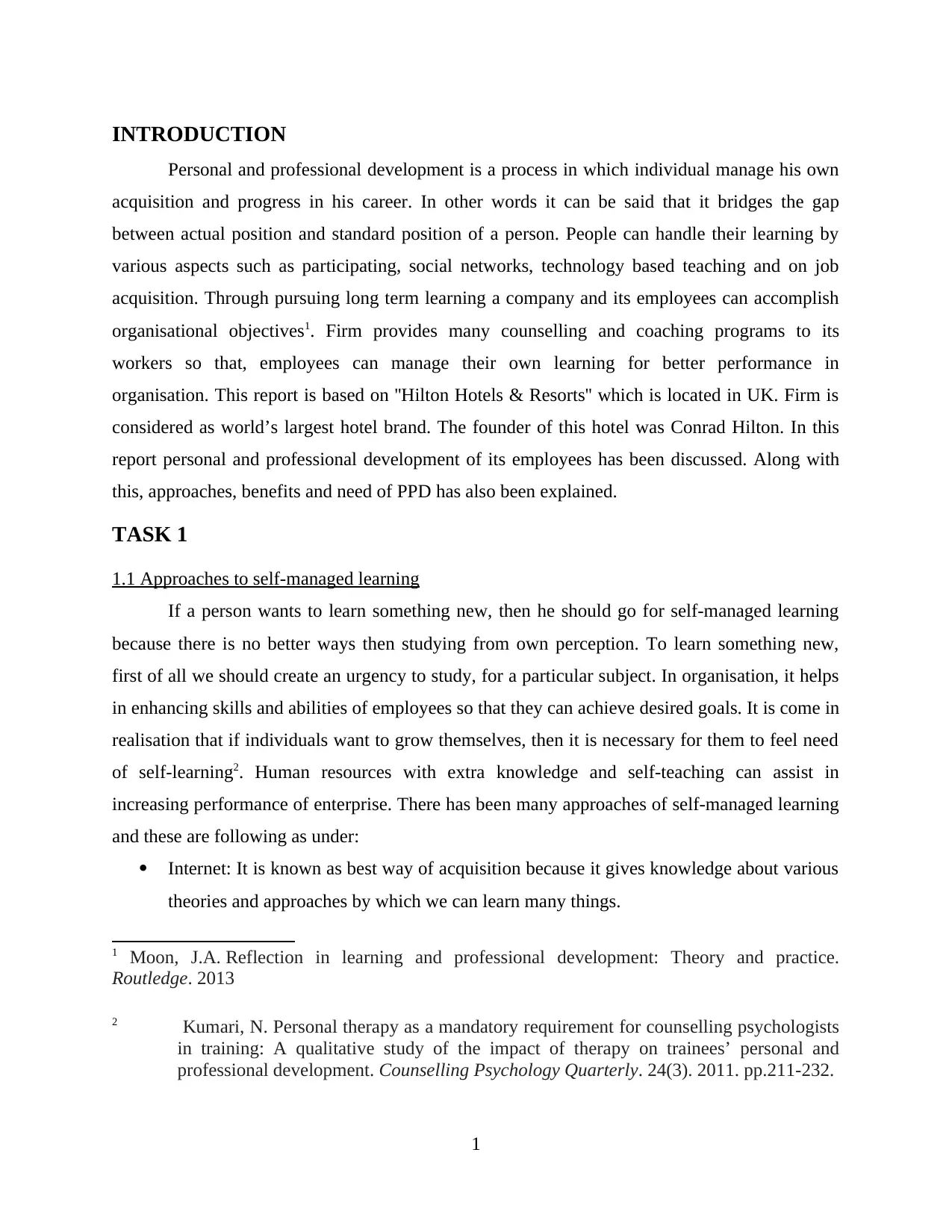
INTRODUCTION
Personal and professional development is a process in which individual manage his own
acquisition and progress in his career. In other words it can be said that it bridges the gap
between actual position and standard position of a person. People can handle their learning by
various aspects such as participating, social networks, technology based teaching and on job
acquisition. Through pursuing long term learning a company and its employees can accomplish
organisational objectives1. Firm provides many counselling and coaching programs to its
workers so that, employees can manage their own learning for better performance in
organisation. This report is based on ''Hilton Hotels & Resorts'' which is located in UK. Firm is
considered as world’s largest hotel brand. The founder of this hotel was Conrad Hilton. In this
report personal and professional development of its employees has been discussed. Along with
this, approaches, benefits and need of PPD has also been explained.
TASK 1
1.1 Approaches to self-managed learning
If a person wants to learn something new, then he should go for self-managed learning
because there is no better ways then studying from own perception. To learn something new,
first of all we should create an urgency to study, for a particular subject. In organisation, it helps
in enhancing skills and abilities of employees so that they can achieve desired goals. It is come in
realisation that if individuals want to grow themselves, then it is necessary for them to feel need
of self-learning2. Human resources with extra knowledge and self-teaching can assist in
increasing performance of enterprise. There has been many approaches of self-managed learning
and these are following as under:
Internet: It is known as best way of acquisition because it gives knowledge about various
theories and approaches by which we can learn many things.
1 Moon, J.A. Reflection in learning and professional development: Theory and practice.
Routledge. 2013
2 Kumari, N. Personal therapy as a mandatory requirement for counselling psychologists
in training: A qualitative study of the impact of therapy on trainees’ personal and
professional development. Counselling Psychology Quarterly. 24(3). 2011. pp.211-232.
1
Personal and professional development is a process in which individual manage his own
acquisition and progress in his career. In other words it can be said that it bridges the gap
between actual position and standard position of a person. People can handle their learning by
various aspects such as participating, social networks, technology based teaching and on job
acquisition. Through pursuing long term learning a company and its employees can accomplish
organisational objectives1. Firm provides many counselling and coaching programs to its
workers so that, employees can manage their own learning for better performance in
organisation. This report is based on ''Hilton Hotels & Resorts'' which is located in UK. Firm is
considered as world’s largest hotel brand. The founder of this hotel was Conrad Hilton. In this
report personal and professional development of its employees has been discussed. Along with
this, approaches, benefits and need of PPD has also been explained.
TASK 1
1.1 Approaches to self-managed learning
If a person wants to learn something new, then he should go for self-managed learning
because there is no better ways then studying from own perception. To learn something new,
first of all we should create an urgency to study, for a particular subject. In organisation, it helps
in enhancing skills and abilities of employees so that they can achieve desired goals. It is come in
realisation that if individuals want to grow themselves, then it is necessary for them to feel need
of self-learning2. Human resources with extra knowledge and self-teaching can assist in
increasing performance of enterprise. There has been many approaches of self-managed learning
and these are following as under:
Internet: It is known as best way of acquisition because it gives knowledge about various
theories and approaches by which we can learn many things.
1 Moon, J.A. Reflection in learning and professional development: Theory and practice.
Routledge. 2013
2 Kumari, N. Personal therapy as a mandatory requirement for counselling psychologists
in training: A qualitative study of the impact of therapy on trainees’ personal and
professional development. Counselling Psychology Quarterly. 24(3). 2011. pp.211-232.
1
Paraphrase This Document
Need a fresh take? Get an instant paraphrase of this document with our AI Paraphraser
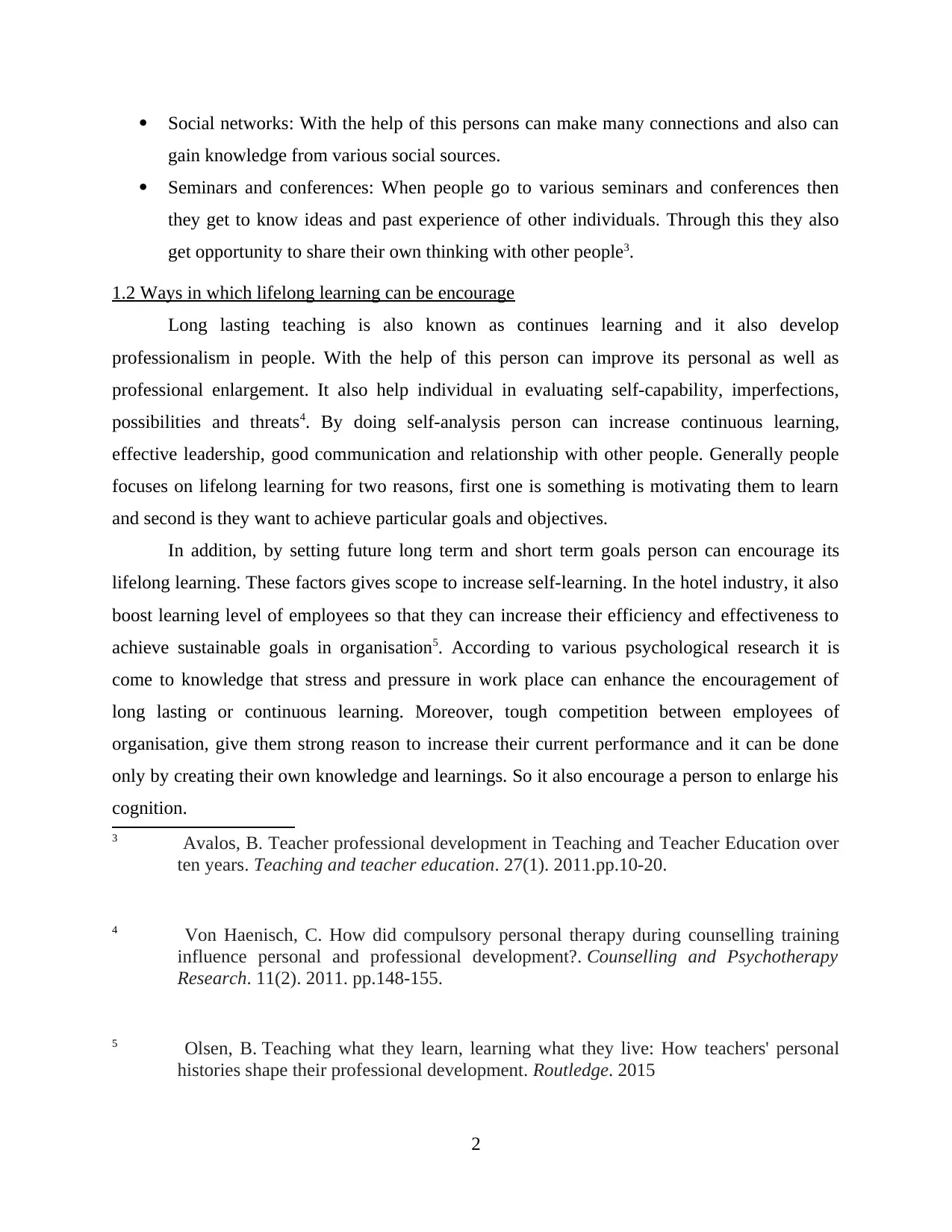
Social networks: With the help of this persons can make many connections and also can
gain knowledge from various social sources.
Seminars and conferences: When people go to various seminars and conferences then
they get to know ideas and past experience of other individuals. Through this they also
get opportunity to share their own thinking with other people3.
1.2 Ways in which lifelong learning can be encourage
Long lasting teaching is also known as continues learning and it also develop
professionalism in people. With the help of this person can improve its personal as well as
professional enlargement. It also help individual in evaluating self-capability, imperfections,
possibilities and threats4. By doing self-analysis person can increase continuous learning,
effective leadership, good communication and relationship with other people. Generally people
focuses on lifelong learning for two reasons, first one is something is motivating them to learn
and second is they want to achieve particular goals and objectives.
In addition, by setting future long term and short term goals person can encourage its
lifelong learning. These factors gives scope to increase self-learning. In the hotel industry, it also
boost learning level of employees so that they can increase their efficiency and effectiveness to
achieve sustainable goals in organisation5. According to various psychological research it is
come to knowledge that stress and pressure in work place can enhance the encouragement of
long lasting or continuous learning. Moreover, tough competition between employees of
organisation, give them strong reason to increase their current performance and it can be done
only by creating their own knowledge and learnings. So it also encourage a person to enlarge his
cognition.
3 Avalos, B. Teacher professional development in Teaching and Teacher Education over
ten years. Teaching and teacher education. 27(1). 2011.pp.10-20.
4 Von Haenisch, C. How did compulsory personal therapy during counselling training
influence personal and professional development?. Counselling and Psychotherapy
Research. 11(2). 2011. pp.148-155.
5 Olsen, B. Teaching what they learn, learning what they live: How teachers' personal
histories shape their professional development. Routledge. 2015
2
gain knowledge from various social sources.
Seminars and conferences: When people go to various seminars and conferences then
they get to know ideas and past experience of other individuals. Through this they also
get opportunity to share their own thinking with other people3.
1.2 Ways in which lifelong learning can be encourage
Long lasting teaching is also known as continues learning and it also develop
professionalism in people. With the help of this person can improve its personal as well as
professional enlargement. It also help individual in evaluating self-capability, imperfections,
possibilities and threats4. By doing self-analysis person can increase continuous learning,
effective leadership, good communication and relationship with other people. Generally people
focuses on lifelong learning for two reasons, first one is something is motivating them to learn
and second is they want to achieve particular goals and objectives.
In addition, by setting future long term and short term goals person can encourage its
lifelong learning. These factors gives scope to increase self-learning. In the hotel industry, it also
boost learning level of employees so that they can increase their efficiency and effectiveness to
achieve sustainable goals in organisation5. According to various psychological research it is
come to knowledge that stress and pressure in work place can enhance the encouragement of
long lasting or continuous learning. Moreover, tough competition between employees of
organisation, give them strong reason to increase their current performance and it can be done
only by creating their own knowledge and learnings. So it also encourage a person to enlarge his
cognition.
3 Avalos, B. Teacher professional development in Teaching and Teacher Education over
ten years. Teaching and teacher education. 27(1). 2011.pp.10-20.
4 Von Haenisch, C. How did compulsory personal therapy during counselling training
influence personal and professional development?. Counselling and Psychotherapy
Research. 11(2). 2011. pp.148-155.
5 Olsen, B. Teaching what they learn, learning what they live: How teachers' personal
histories shape their professional development. Routledge. 2015
2
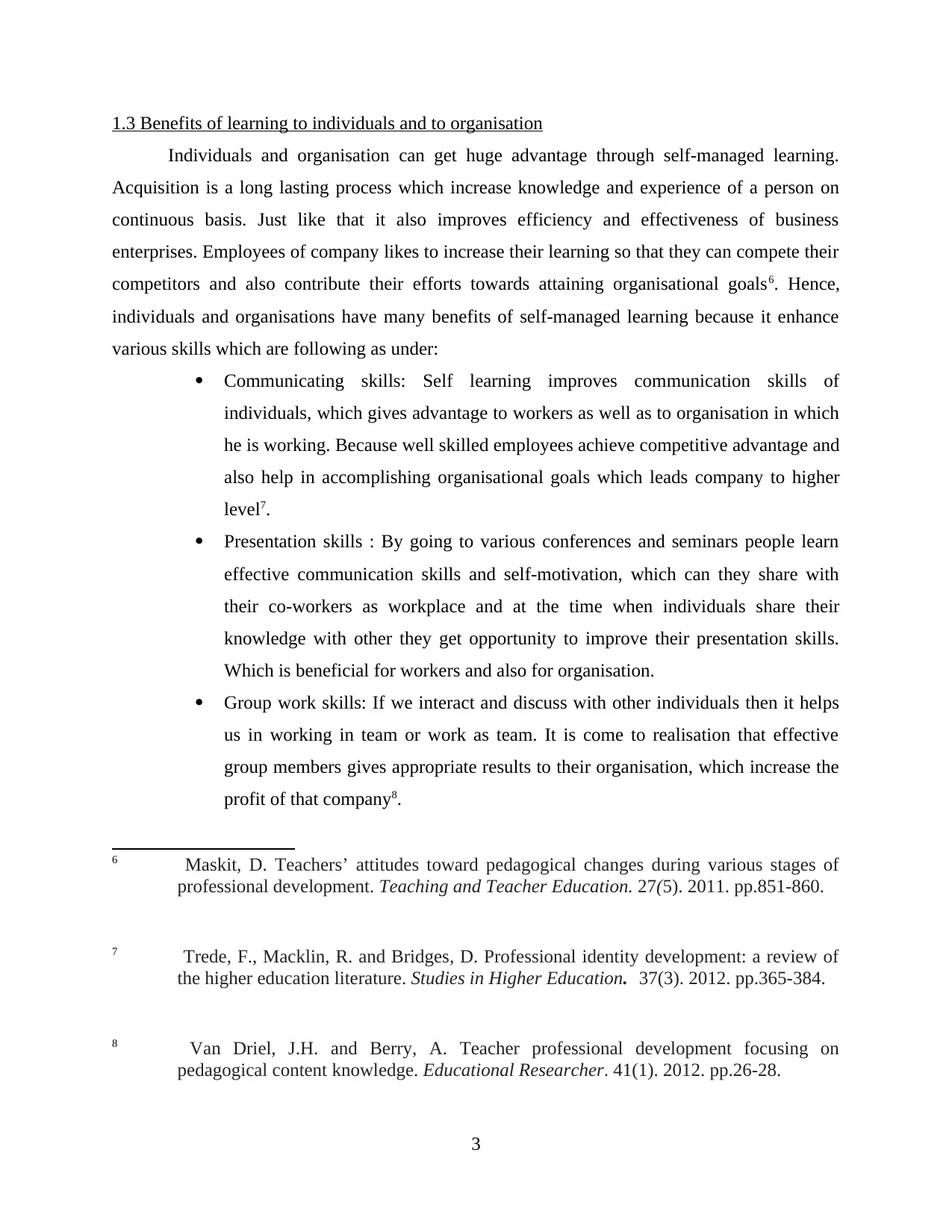
1.3 Benefits of learning to individuals and to organisation
Individuals and organisation can get huge advantage through self-managed learning.
Acquisition is a long lasting process which increase knowledge and experience of a person on
continuous basis. Just like that it also improves efficiency and effectiveness of business
enterprises. Employees of company likes to increase their learning so that they can compete their
competitors and also contribute their efforts towards attaining organisational goals6. Hence,
individuals and organisations have many benefits of self-managed learning because it enhance
various skills which are following as under:
Communicating skills: Self learning improves communication skills of
individuals, which gives advantage to workers as well as to organisation in which
he is working. Because well skilled employees achieve competitive advantage and
also help in accomplishing organisational goals which leads company to higher
level7.
Presentation skills : By going to various conferences and seminars people learn
effective communication skills and self-motivation, which can they share with
their co-workers as workplace and at the time when individuals share their
knowledge with other they get opportunity to improve their presentation skills.
Which is beneficial for workers and also for organisation.
Group work skills: If we interact and discuss with other individuals then it helps
us in working in team or work as team. It is come to realisation that effective
group members gives appropriate results to their organisation, which increase the
profit of that company8.
6 Maskit, D. Teachers’ attitudes toward pedagogical changes during various stages of
professional development. Teaching and Teacher Education. 27(5). 2011. pp.851-860.
7 Trede, F., Macklin, R. and Bridges, D. Professional identity development: a review of
the higher education literature. Studies in Higher Education. 37(3). 2012. pp.365-384.
8 Van Driel, J.H. and Berry, A. Teacher professional development focusing on
pedagogical content knowledge. Educational Researcher. 41(1). 2012. pp.26-28.
3
Individuals and organisation can get huge advantage through self-managed learning.
Acquisition is a long lasting process which increase knowledge and experience of a person on
continuous basis. Just like that it also improves efficiency and effectiveness of business
enterprises. Employees of company likes to increase their learning so that they can compete their
competitors and also contribute their efforts towards attaining organisational goals6. Hence,
individuals and organisations have many benefits of self-managed learning because it enhance
various skills which are following as under:
Communicating skills: Self learning improves communication skills of
individuals, which gives advantage to workers as well as to organisation in which
he is working. Because well skilled employees achieve competitive advantage and
also help in accomplishing organisational goals which leads company to higher
level7.
Presentation skills : By going to various conferences and seminars people learn
effective communication skills and self-motivation, which can they share with
their co-workers as workplace and at the time when individuals share their
knowledge with other they get opportunity to improve their presentation skills.
Which is beneficial for workers and also for organisation.
Group work skills: If we interact and discuss with other individuals then it helps
us in working in team or work as team. It is come to realisation that effective
group members gives appropriate results to their organisation, which increase the
profit of that company8.
6 Maskit, D. Teachers’ attitudes toward pedagogical changes during various stages of
professional development. Teaching and Teacher Education. 27(5). 2011. pp.851-860.
7 Trede, F., Macklin, R. and Bridges, D. Professional identity development: a review of
the higher education literature. Studies in Higher Education. 37(3). 2012. pp.365-384.
8 Van Driel, J.H. and Berry, A. Teacher professional development focusing on
pedagogical content knowledge. Educational Researcher. 41(1). 2012. pp.26-28.
3
⊘ This is a preview!⊘
Do you want full access?
Subscribe today to unlock all pages.

Trusted by 1+ million students worldwide
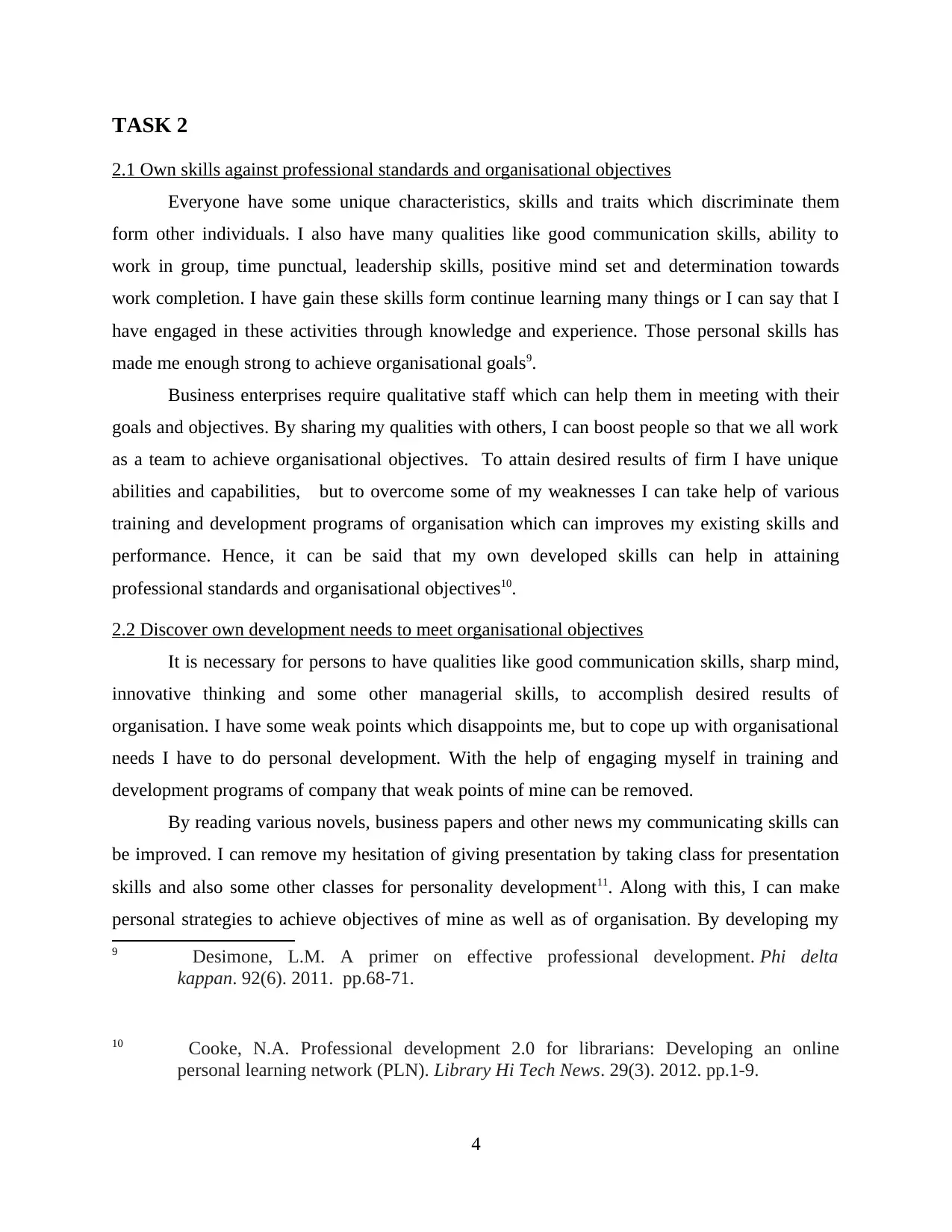
TASK 2
2.1 Own skills against professional standards and organisational objectives
Everyone have some unique characteristics, skills and traits which discriminate them
form other individuals. I also have many qualities like good communication skills, ability to
work in group, time punctual, leadership skills, positive mind set and determination towards
work completion. I have gain these skills form continue learning many things or I can say that I
have engaged in these activities through knowledge and experience. Those personal skills has
made me enough strong to achieve organisational goals9.
Business enterprises require qualitative staff which can help them in meeting with their
goals and objectives. By sharing my qualities with others, I can boost people so that we all work
as a team to achieve organisational objectives. To attain desired results of firm I have unique
abilities and capabilities, but to overcome some of my weaknesses I can take help of various
training and development programs of organisation which can improves my existing skills and
performance. Hence, it can be said that my own developed skills can help in attaining
professional standards and organisational objectives10.
2.2 Discover own development needs to meet organisational objectives
It is necessary for persons to have qualities like good communication skills, sharp mind,
innovative thinking and some other managerial skills, to accomplish desired results of
organisation. I have some weak points which disappoints me, but to cope up with organisational
needs I have to do personal development. With the help of engaging myself in training and
development programs of company that weak points of mine can be removed.
By reading various novels, business papers and other news my communicating skills can
be improved. I can remove my hesitation of giving presentation by taking class for presentation
skills and also some other classes for personality development11. Along with this, I can make
personal strategies to achieve objectives of mine as well as of organisation. By developing my
9 Desimone, L.M. A primer on effective professional development. Phi delta
kappan. 92(6). 2011. pp.68-71.
10 Cooke, N.A. Professional development 2.0 for librarians: Developing an online
personal learning network (PLN). Library Hi Tech News. 29(3). 2012. pp.1-9.
4
2.1 Own skills against professional standards and organisational objectives
Everyone have some unique characteristics, skills and traits which discriminate them
form other individuals. I also have many qualities like good communication skills, ability to
work in group, time punctual, leadership skills, positive mind set and determination towards
work completion. I have gain these skills form continue learning many things or I can say that I
have engaged in these activities through knowledge and experience. Those personal skills has
made me enough strong to achieve organisational goals9.
Business enterprises require qualitative staff which can help them in meeting with their
goals and objectives. By sharing my qualities with others, I can boost people so that we all work
as a team to achieve organisational objectives. To attain desired results of firm I have unique
abilities and capabilities, but to overcome some of my weaknesses I can take help of various
training and development programs of organisation which can improves my existing skills and
performance. Hence, it can be said that my own developed skills can help in attaining
professional standards and organisational objectives10.
2.2 Discover own development needs to meet organisational objectives
It is necessary for persons to have qualities like good communication skills, sharp mind,
innovative thinking and some other managerial skills, to accomplish desired results of
organisation. I have some weak points which disappoints me, but to cope up with organisational
needs I have to do personal development. With the help of engaging myself in training and
development programs of company that weak points of mine can be removed.
By reading various novels, business papers and other news my communicating skills can
be improved. I can remove my hesitation of giving presentation by taking class for presentation
skills and also some other classes for personality development11. Along with this, I can make
personal strategies to achieve objectives of mine as well as of organisation. By developing my
9 Desimone, L.M. A primer on effective professional development. Phi delta
kappan. 92(6). 2011. pp.68-71.
10 Cooke, N.A. Professional development 2.0 for librarians: Developing an online
personal learning network (PLN). Library Hi Tech News. 29(3). 2012. pp.1-9.
4
Paraphrase This Document
Need a fresh take? Get an instant paraphrase of this document with our AI Paraphraser
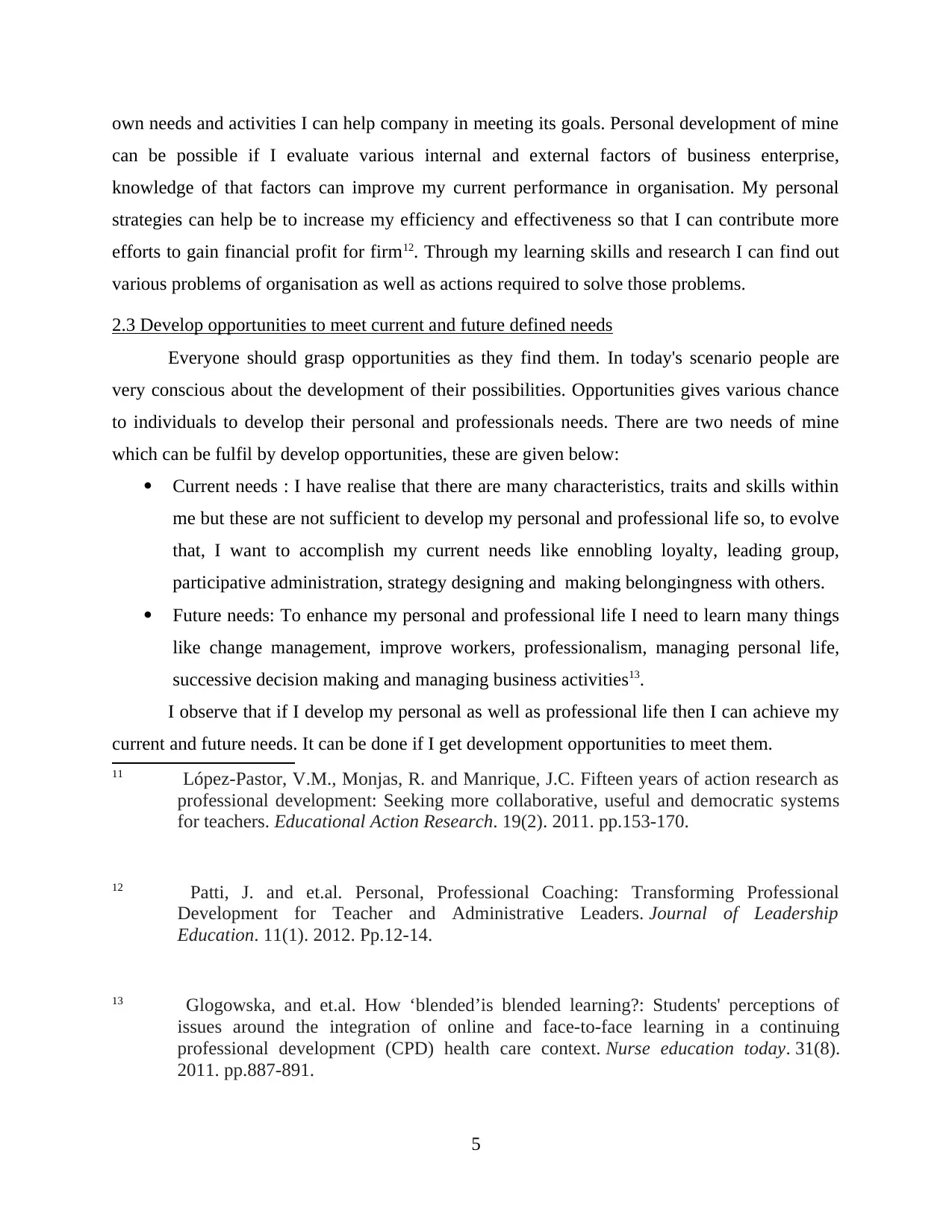
own needs and activities I can help company in meeting its goals. Personal development of mine
can be possible if I evaluate various internal and external factors of business enterprise,
knowledge of that factors can improve my current performance in organisation. My personal
strategies can help be to increase my efficiency and effectiveness so that I can contribute more
efforts to gain financial profit for firm12. Through my learning skills and research I can find out
various problems of organisation as well as actions required to solve those problems.
2.3 Develop opportunities to meet current and future defined needs
Everyone should grasp opportunities as they find them. In today's scenario people are
very conscious about the development of their possibilities. Opportunities gives various chance
to individuals to develop their personal and professionals needs. There are two needs of mine
which can be fulfil by develop opportunities, these are given below:
Current needs : I have realise that there are many characteristics, traits and skills within
me but these are not sufficient to develop my personal and professional life so, to evolve
that, I want to accomplish my current needs like ennobling loyalty, leading group,
participative administration, strategy designing and making belongingness with others.
Future needs: To enhance my personal and professional life I need to learn many things
like change management, improve workers, professionalism, managing personal life,
successive decision making and managing business activities13.
I observe that if I develop my personal as well as professional life then I can achieve my
current and future needs. It can be done if I get development opportunities to meet them.
11 López‐Pastor, V.M., Monjas, R. and Manrique, J.C. Fifteen years of action research as
professional development: Seeking more collaborative, useful and democratic systems
for teachers. Educational Action Research. 19(2). 2011. pp.153-170.
12 Patti, J. and et.al. Personal, Professional Coaching: Transforming Professional
Development for Teacher and Administrative Leaders. Journal of Leadership
Education. 11(1). 2012. Pp.12-14.
13 Glogowska, and et.al. How ‘blended’is blended learning?: Students' perceptions of
issues around the integration of online and face-to-face learning in a continuing
professional development (CPD) health care context. Nurse education today. 31(8).
2011. pp.887-891.
5
can be possible if I evaluate various internal and external factors of business enterprise,
knowledge of that factors can improve my current performance in organisation. My personal
strategies can help be to increase my efficiency and effectiveness so that I can contribute more
efforts to gain financial profit for firm12. Through my learning skills and research I can find out
various problems of organisation as well as actions required to solve those problems.
2.3 Develop opportunities to meet current and future defined needs
Everyone should grasp opportunities as they find them. In today's scenario people are
very conscious about the development of their possibilities. Opportunities gives various chance
to individuals to develop their personal and professionals needs. There are two needs of mine
which can be fulfil by develop opportunities, these are given below:
Current needs : I have realise that there are many characteristics, traits and skills within
me but these are not sufficient to develop my personal and professional life so, to evolve
that, I want to accomplish my current needs like ennobling loyalty, leading group,
participative administration, strategy designing and making belongingness with others.
Future needs: To enhance my personal and professional life I need to learn many things
like change management, improve workers, professionalism, managing personal life,
successive decision making and managing business activities13.
I observe that if I develop my personal as well as professional life then I can achieve my
current and future needs. It can be done if I get development opportunities to meet them.
11 López‐Pastor, V.M., Monjas, R. and Manrique, J.C. Fifteen years of action research as
professional development: Seeking more collaborative, useful and democratic systems
for teachers. Educational Action Research. 19(2). 2011. pp.153-170.
12 Patti, J. and et.al. Personal, Professional Coaching: Transforming Professional
Development for Teacher and Administrative Leaders. Journal of Leadership
Education. 11(1). 2012. Pp.12-14.
13 Glogowska, and et.al. How ‘blended’is blended learning?: Students' perceptions of
issues around the integration of online and face-to-face learning in a continuing
professional development (CPD) health care context. Nurse education today. 31(8).
2011. pp.887-891.
5
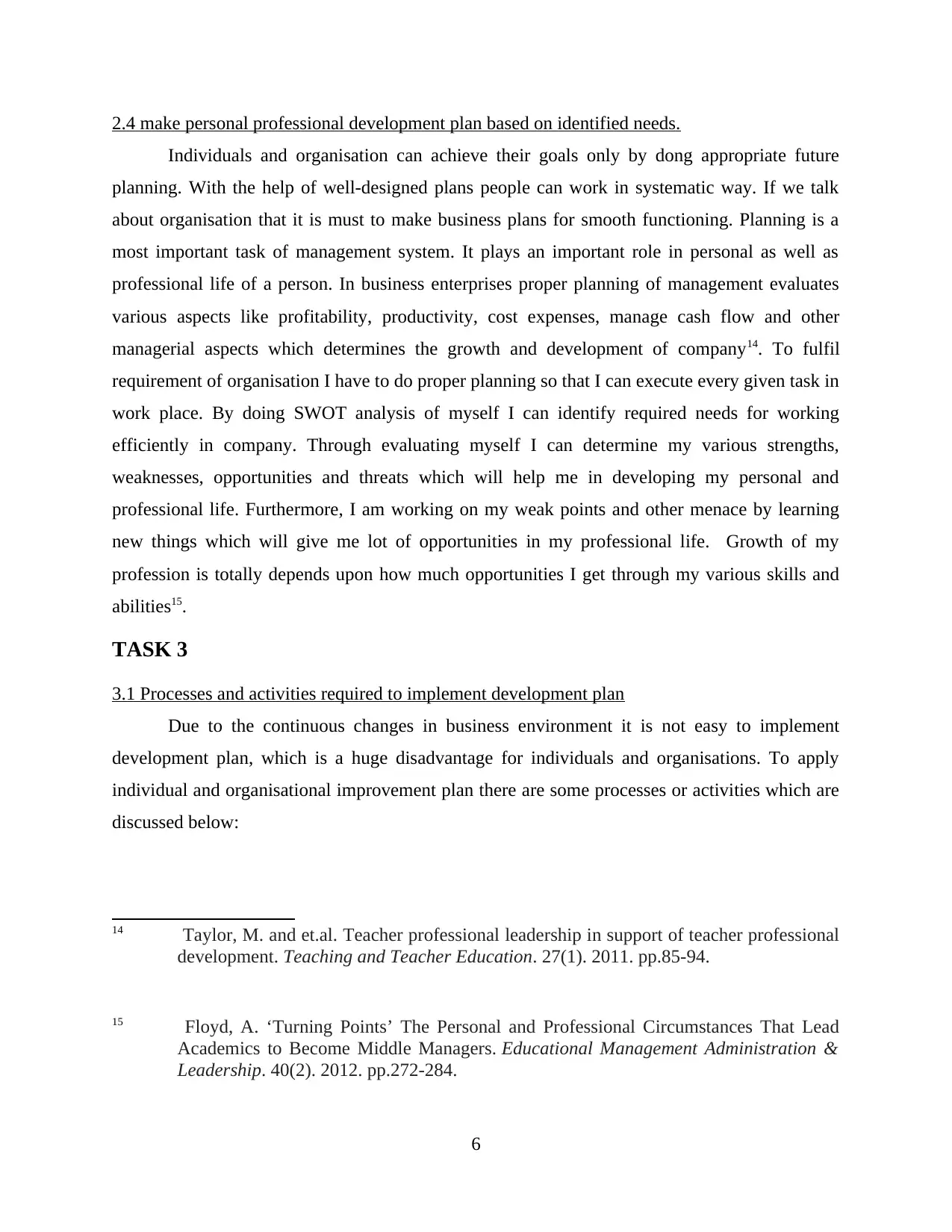
2.4 make personal professional development plan based on identified needs.
Individuals and organisation can achieve their goals only by dong appropriate future
planning. With the help of well-designed plans people can work in systematic way. If we talk
about organisation that it is must to make business plans for smooth functioning. Planning is a
most important task of management system. It plays an important role in personal as well as
professional life of a person. In business enterprises proper planning of management evaluates
various aspects like profitability, productivity, cost expenses, manage cash flow and other
managerial aspects which determines the growth and development of company14. To fulfil
requirement of organisation I have to do proper planning so that I can execute every given task in
work place. By doing SWOT analysis of myself I can identify required needs for working
efficiently in company. Through evaluating myself I can determine my various strengths,
weaknesses, opportunities and threats which will help me in developing my personal and
professional life. Furthermore, I am working on my weak points and other menace by learning
new things which will give me lot of opportunities in my professional life. Growth of my
profession is totally depends upon how much opportunities I get through my various skills and
abilities15.
TASK 3
3.1 Processes and activities required to implement development plan
Due to the continuous changes in business environment it is not easy to implement
development plan, which is a huge disadvantage for individuals and organisations. To apply
individual and organisational improvement plan there are some processes or activities which are
discussed below:
14 Taylor, M. and et.al. Teacher professional leadership in support of teacher professional
development. Teaching and Teacher Education. 27(1). 2011. pp.85-94.
15 Floyd, A. ‘Turning Points’ The Personal and Professional Circumstances That Lead
Academics to Become Middle Managers. Educational Management Administration &
Leadership. 40(2). 2012. pp.272-284.
6
Individuals and organisation can achieve their goals only by dong appropriate future
planning. With the help of well-designed plans people can work in systematic way. If we talk
about organisation that it is must to make business plans for smooth functioning. Planning is a
most important task of management system. It plays an important role in personal as well as
professional life of a person. In business enterprises proper planning of management evaluates
various aspects like profitability, productivity, cost expenses, manage cash flow and other
managerial aspects which determines the growth and development of company14. To fulfil
requirement of organisation I have to do proper planning so that I can execute every given task in
work place. By doing SWOT analysis of myself I can identify required needs for working
efficiently in company. Through evaluating myself I can determine my various strengths,
weaknesses, opportunities and threats which will help me in developing my personal and
professional life. Furthermore, I am working on my weak points and other menace by learning
new things which will give me lot of opportunities in my professional life. Growth of my
profession is totally depends upon how much opportunities I get through my various skills and
abilities15.
TASK 3
3.1 Processes and activities required to implement development plan
Due to the continuous changes in business environment it is not easy to implement
development plan, which is a huge disadvantage for individuals and organisations. To apply
individual and organisational improvement plan there are some processes or activities which are
discussed below:
14 Taylor, M. and et.al. Teacher professional leadership in support of teacher professional
development. Teaching and Teacher Education. 27(1). 2011. pp.85-94.
15 Floyd, A. ‘Turning Points’ The Personal and Professional Circumstances That Lead
Academics to Become Middle Managers. Educational Management Administration &
Leadership. 40(2). 2012. pp.272-284.
6
⊘ This is a preview!⊘
Do you want full access?
Subscribe today to unlock all pages.

Trusted by 1+ million students worldwide
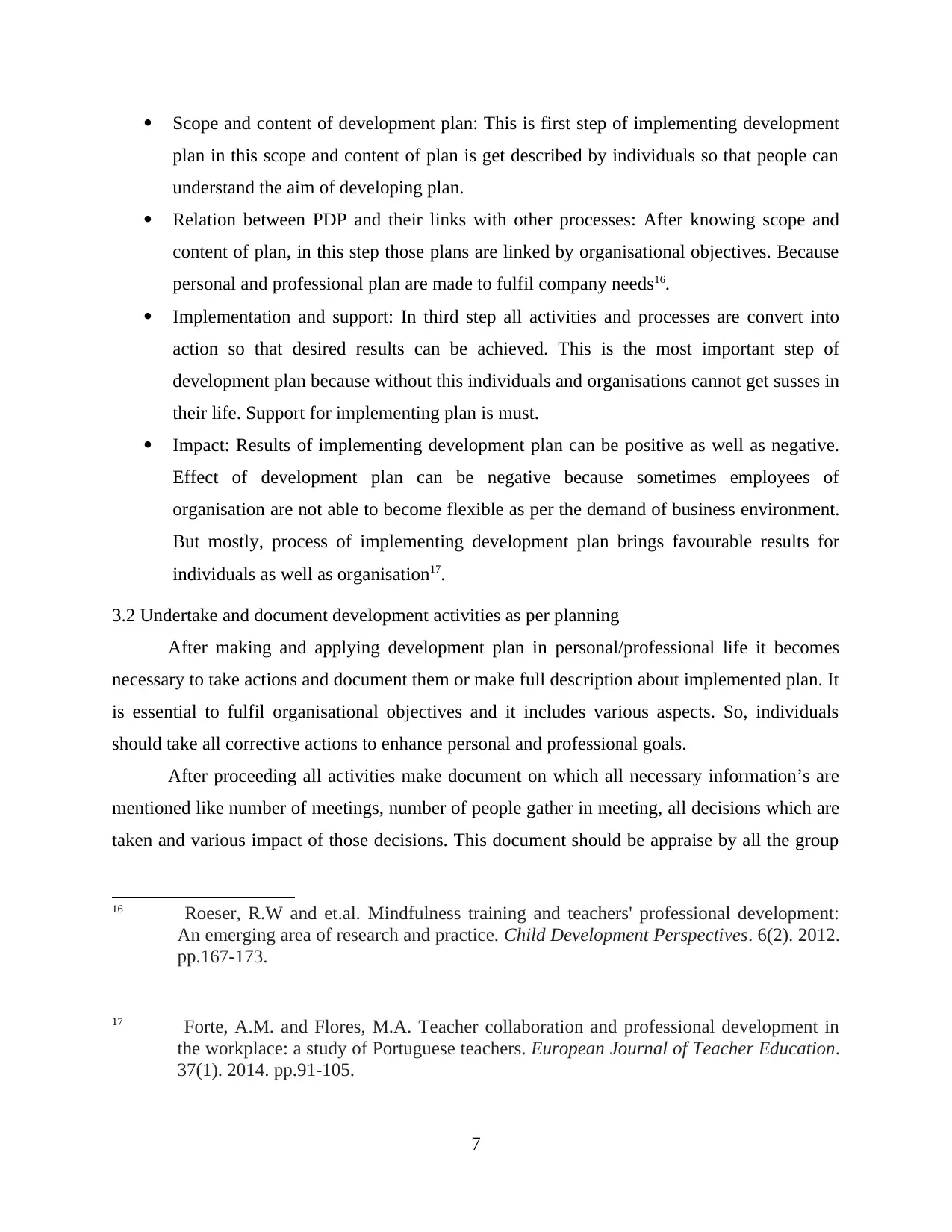
Scope and content of development plan: This is first step of implementing development
plan in this scope and content of plan is get described by individuals so that people can
understand the aim of developing plan.
Relation between PDP and their links with other processes: After knowing scope and
content of plan, in this step those plans are linked by organisational objectives. Because
personal and professional plan are made to fulfil company needs16.
Implementation and support: In third step all activities and processes are convert into
action so that desired results can be achieved. This is the most important step of
development plan because without this individuals and organisations cannot get susses in
their life. Support for implementing plan is must.
Impact: Results of implementing development plan can be positive as well as negative.
Effect of development plan can be negative because sometimes employees of
organisation are not able to become flexible as per the demand of business environment.
But mostly, process of implementing development plan brings favourable results for
individuals as well as organisation17.
3.2 Undertake and document development activities as per planning
After making and applying development plan in personal/professional life it becomes
necessary to take actions and document them or make full description about implemented plan. It
is essential to fulfil organisational objectives and it includes various aspects. So, individuals
should take all corrective actions to enhance personal and professional goals.
After proceeding all activities make document on which all necessary information’s are
mentioned like number of meetings, number of people gather in meeting, all decisions which are
taken and various impact of those decisions. This document should be appraise by all the group
16 Roeser, R.W and et.al. Mindfulness training and teachers' professional development:
An emerging area of research and practice. Child Development Perspectives. 6(2). 2012.
pp.167-173.
17 Forte, A.M. and Flores, M.A. Teacher collaboration and professional development in
the workplace: a study of Portuguese teachers. European Journal of Teacher Education.
37(1). 2014. pp.91-105.
7
plan in this scope and content of plan is get described by individuals so that people can
understand the aim of developing plan.
Relation between PDP and their links with other processes: After knowing scope and
content of plan, in this step those plans are linked by organisational objectives. Because
personal and professional plan are made to fulfil company needs16.
Implementation and support: In third step all activities and processes are convert into
action so that desired results can be achieved. This is the most important step of
development plan because without this individuals and organisations cannot get susses in
their life. Support for implementing plan is must.
Impact: Results of implementing development plan can be positive as well as negative.
Effect of development plan can be negative because sometimes employees of
organisation are not able to become flexible as per the demand of business environment.
But mostly, process of implementing development plan brings favourable results for
individuals as well as organisation17.
3.2 Undertake and document development activities as per planning
After making and applying development plan in personal/professional life it becomes
necessary to take actions and document them or make full description about implemented plan. It
is essential to fulfil organisational objectives and it includes various aspects. So, individuals
should take all corrective actions to enhance personal and professional goals.
After proceeding all activities make document on which all necessary information’s are
mentioned like number of meetings, number of people gather in meeting, all decisions which are
taken and various impact of those decisions. This document should be appraise by all the group
16 Roeser, R.W and et.al. Mindfulness training and teachers' professional development:
An emerging area of research and practice. Child Development Perspectives. 6(2). 2012.
pp.167-173.
17 Forte, A.M. and Flores, M.A. Teacher collaboration and professional development in
the workplace: a study of Portuguese teachers. European Journal of Teacher Education.
37(1). 2014. pp.91-105.
7
Paraphrase This Document
Need a fresh take? Get an instant paraphrase of this document with our AI Paraphraser
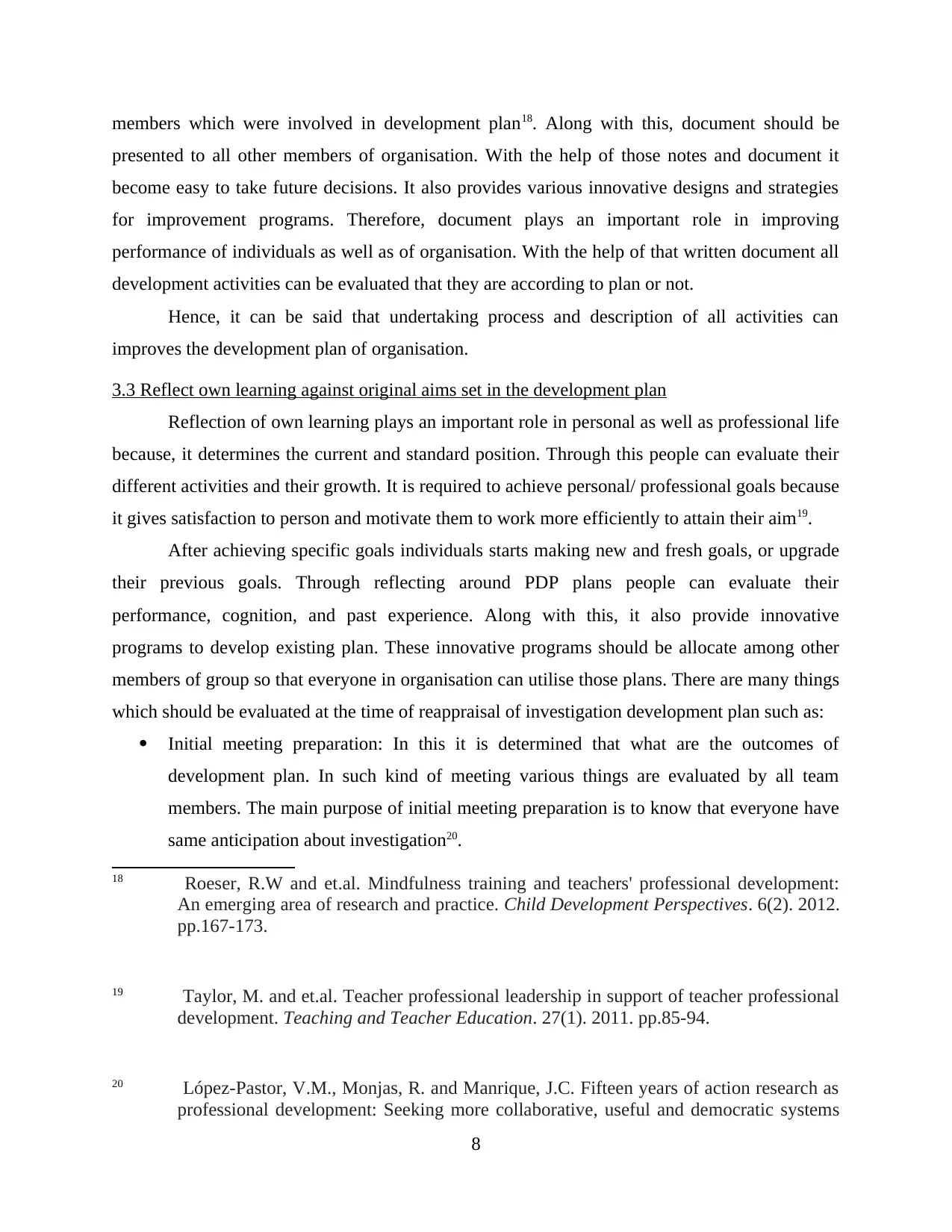
members which were involved in development plan18. Along with this, document should be
presented to all other members of organisation. With the help of those notes and document it
become easy to take future decisions. It also provides various innovative designs and strategies
for improvement programs. Therefore, document plays an important role in improving
performance of individuals as well as of organisation. With the help of that written document all
development activities can be evaluated that they are according to plan or not.
Hence, it can be said that undertaking process and description of all activities can
improves the development plan of organisation.
3.3 Reflect own learning against original aims set in the development plan
Reflection of own learning plays an important role in personal as well as professional life
because, it determines the current and standard position. Through this people can evaluate their
different activities and their growth. It is required to achieve personal/ professional goals because
it gives satisfaction to person and motivate them to work more efficiently to attain their aim19.
After achieving specific goals individuals starts making new and fresh goals, or upgrade
their previous goals. Through reflecting around PDP plans people can evaluate their
performance, cognition, and past experience. Along with this, it also provide innovative
programs to develop existing plan. These innovative programs should be allocate among other
members of group so that everyone in organisation can utilise those plans. There are many things
which should be evaluated at the time of reappraisal of investigation development plan such as:
Initial meeting preparation: In this it is determined that what are the outcomes of
development plan. In such kind of meeting various things are evaluated by all team
members. The main purpose of initial meeting preparation is to know that everyone have
same anticipation about investigation20.
18 Roeser, R.W and et.al. Mindfulness training and teachers' professional development:
An emerging area of research and practice. Child Development Perspectives. 6(2). 2012.
pp.167-173.
19 Taylor, M. and et.al. Teacher professional leadership in support of teacher professional
development. Teaching and Teacher Education. 27(1). 2011. pp.85-94.
20 López‐Pastor, V.M., Monjas, R. and Manrique, J.C. Fifteen years of action research as
professional development: Seeking more collaborative, useful and democratic systems
8
presented to all other members of organisation. With the help of those notes and document it
become easy to take future decisions. It also provides various innovative designs and strategies
for improvement programs. Therefore, document plays an important role in improving
performance of individuals as well as of organisation. With the help of that written document all
development activities can be evaluated that they are according to plan or not.
Hence, it can be said that undertaking process and description of all activities can
improves the development plan of organisation.
3.3 Reflect own learning against original aims set in the development plan
Reflection of own learning plays an important role in personal as well as professional life
because, it determines the current and standard position. Through this people can evaluate their
different activities and their growth. It is required to achieve personal/ professional goals because
it gives satisfaction to person and motivate them to work more efficiently to attain their aim19.
After achieving specific goals individuals starts making new and fresh goals, or upgrade
their previous goals. Through reflecting around PDP plans people can evaluate their
performance, cognition, and past experience. Along with this, it also provide innovative
programs to develop existing plan. These innovative programs should be allocate among other
members of group so that everyone in organisation can utilise those plans. There are many things
which should be evaluated at the time of reappraisal of investigation development plan such as:
Initial meeting preparation: In this it is determined that what are the outcomes of
development plan. In such kind of meeting various things are evaluated by all team
members. The main purpose of initial meeting preparation is to know that everyone have
same anticipation about investigation20.
18 Roeser, R.W and et.al. Mindfulness training and teachers' professional development:
An emerging area of research and practice. Child Development Perspectives. 6(2). 2012.
pp.167-173.
19 Taylor, M. and et.al. Teacher professional leadership in support of teacher professional
development. Teaching and Teacher Education. 27(1). 2011. pp.85-94.
20 López‐Pastor, V.M., Monjas, R. and Manrique, J.C. Fifteen years of action research as
professional development: Seeking more collaborative, useful and democratic systems
8
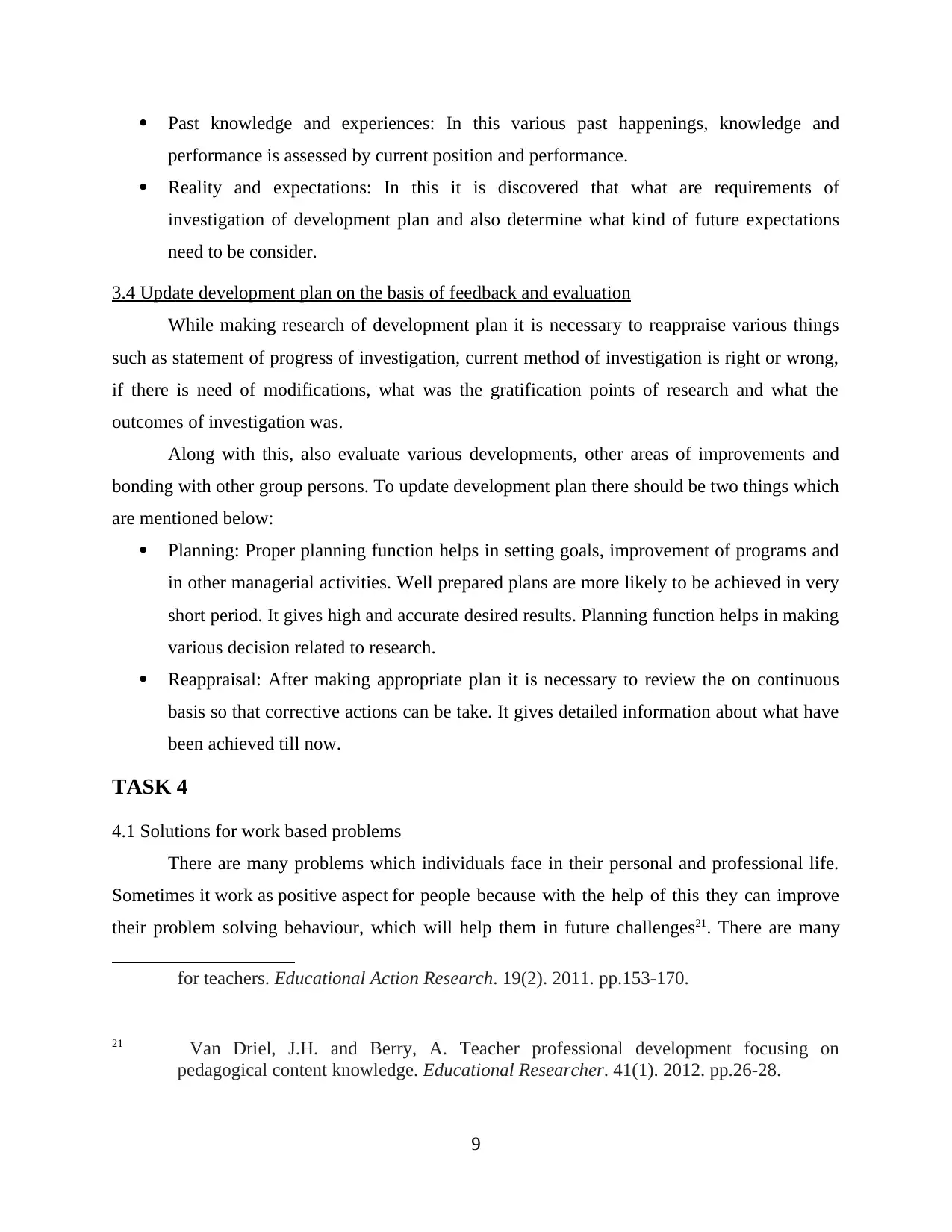
Past knowledge and experiences: In this various past happenings, knowledge and
performance is assessed by current position and performance.
Reality and expectations: In this it is discovered that what are requirements of
investigation of development plan and also determine what kind of future expectations
need to be consider.
3.4 Update development plan on the basis of feedback and evaluation
While making research of development plan it is necessary to reappraise various things
such as statement of progress of investigation, current method of investigation is right or wrong,
if there is need of modifications, what was the gratification points of research and what the
outcomes of investigation was.
Along with this, also evaluate various developments, other areas of improvements and
bonding with other group persons. To update development plan there should be two things which
are mentioned below:
Planning: Proper planning function helps in setting goals, improvement of programs and
in other managerial activities. Well prepared plans are more likely to be achieved in very
short period. It gives high and accurate desired results. Planning function helps in making
various decision related to research.
Reappraisal: After making appropriate plan it is necessary to review the on continuous
basis so that corrective actions can be take. It gives detailed information about what have
been achieved till now.
TASK 4
4.1 Solutions for work based problems
There are many problems which individuals face in their personal and professional life.
Sometimes it work as positive aspect for people because with the help of this they can improve
their problem solving behaviour, which will help them in future challenges21. There are many
for teachers. Educational Action Research. 19(2). 2011. pp.153-170.
21 Van Driel, J.H. and Berry, A. Teacher professional development focusing on
pedagogical content knowledge. Educational Researcher. 41(1). 2012. pp.26-28.
9
performance is assessed by current position and performance.
Reality and expectations: In this it is discovered that what are requirements of
investigation of development plan and also determine what kind of future expectations
need to be consider.
3.4 Update development plan on the basis of feedback and evaluation
While making research of development plan it is necessary to reappraise various things
such as statement of progress of investigation, current method of investigation is right or wrong,
if there is need of modifications, what was the gratification points of research and what the
outcomes of investigation was.
Along with this, also evaluate various developments, other areas of improvements and
bonding with other group persons. To update development plan there should be two things which
are mentioned below:
Planning: Proper planning function helps in setting goals, improvement of programs and
in other managerial activities. Well prepared plans are more likely to be achieved in very
short period. It gives high and accurate desired results. Planning function helps in making
various decision related to research.
Reappraisal: After making appropriate plan it is necessary to review the on continuous
basis so that corrective actions can be take. It gives detailed information about what have
been achieved till now.
TASK 4
4.1 Solutions for work based problems
There are many problems which individuals face in their personal and professional life.
Sometimes it work as positive aspect for people because with the help of this they can improve
their problem solving behaviour, which will help them in future challenges21. There are many
for teachers. Educational Action Research. 19(2). 2011. pp.153-170.
21 Van Driel, J.H. and Berry, A. Teacher professional development focusing on
pedagogical content knowledge. Educational Researcher. 41(1). 2012. pp.26-28.
9
⊘ This is a preview!⊘
Do you want full access?
Subscribe today to unlock all pages.

Trusted by 1+ million students worldwide
1 out of 17
Related Documents
Your All-in-One AI-Powered Toolkit for Academic Success.
+13062052269
info@desklib.com
Available 24*7 on WhatsApp / Email
![[object Object]](/_next/static/media/star-bottom.7253800d.svg)
Unlock your academic potential
Copyright © 2020–2026 A2Z Services. All Rights Reserved. Developed and managed by ZUCOL.





